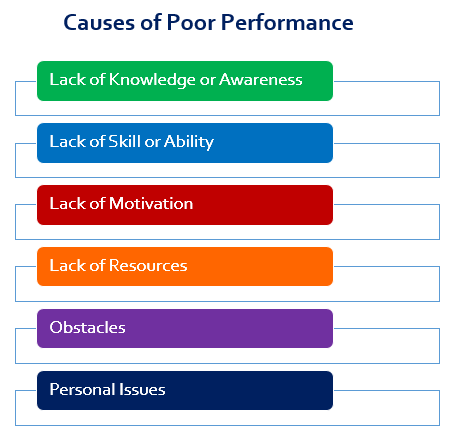Causes of Poor Performance in the Workplace
There can be several causes of poor performance in the workplace. Therefore, before you make any effort to improve a person’s performance, you first must identify the root cause(s) of the poor performance. Just like a doctor would approach an illness, you need to use a similar approach when assessing performance. The outward symptoms of a performance problem may be obvious, but the underlying causes may not be as clear, so an assessment of the actual cause(s) is necessary to fix the problem.
For example, a sales person’s monthly numbers may obviously be down, but why they are down is what you need to find out. It may be because of market conditions, lack of motivation, lack of confidence, issues at home, or a number of other reasons.
This article highlights potential underlying causes that may adversely affect workplace performance.
Causes of Poor Performance in the Workplace Overview
Whenever the individual is failing to deliver the desired performance, it is typically because one or more of the following conditions exist.
- Lack of Knowledge or Awareness
- Lack of Skill or Ability
- Lack of Motivation
- Lack of Resources
- Obstacles
- Personal Issues
Causes of Poor Performance Explained
Lack of Knowledge or Awareness
Lack of knowledge or awareness is one of the biggest barriers to good performance especially if a person is new to a position. People need to know exactly how to do the job correctly and what is expected of them. This issue can be solved thorough education. However, this education may be for different reasons.
Education may be needed to:
- explain the steps of the process of completing the job correctly
- clearly communicate job expectations with the employee
- educate them on how their role and work contributes to the overall success of the company
- educate them on an effective strategy or plan of execution
Employees need to know how to do their job, what is expected of them, and how their performance is aligned with organizational goals. If they do not know these elements, their performance may be adversely affected.
Lack of Skill or Ability
A skill is the learned proficiency to perform a task or action competently. Ability is the physical, intellectual, or emotional capability of an employee to complete a job. A lack of skill can often be solved by training, while an ability cannot. If a person does not have the ability to perform the job role, the role may need to be modified or the employee may need to find another role.
A person needs to be trained on how to do a job effectively by learning the required skills and developing the ability to perform the job functions. If a person was never trained adequately it will directly affect their performance.
Lack of Resources
A lack of resources may include time, money, personnel, equipment, or supplies to complete a task. A worker can be highly motivated, skilled, and knowledgeable, but if they lack any of these resources they would not be able to complete the task correctly and efficiently. This issue can be addressed by providing the resource. However, if not addressed, it can cause other issues including frustration and lack of motivation.
Lack of Motivation
Lacking motivation means that the person lacks the drive to do their best. Even though an employee may have the knowledge, skill, and ability to perform the job functions, they may simply be disengaged and not have the desire to do so.
This lack of motivation is often a symptom of another underlying problem.
These underlying issues include;
- tasks are not challenging and the person is bored
- extremely high expectations and demands being placed upon employees
- lack of effective leadership
- person may feel a lack of appreciation whether it is with money, opportunity, or recognition
- workplace feels toxic, stagnant, or uninspiring
Since lack of motivation can be caused by an array of underlying issues, it is important to accurately determine that issue and to address it.
Obstacles
Obstacles can crop up at any time and can adversely affect the normal productivity of an individual. Obstacles might include technology barriers, interpersonal issues, equipment failures, and information blocks.
This issue can be fixed by determining the obstacle(s) and taking corrective actions to remove the barrier.
Personal Issues
Personal issues such as health challenges or relationship problems can adversely affect an individual’s performance at work. Although personal issues affect a person’s motivation to perform well, it should be treated as a separate cause because the solutions to fix such problems are significantly different from those to fix a lack of motivation.
Personal issues cause stress and the inability to focus on the task at hand. It is not that the person does not want to perform well, but rather has difficultly because their mind is elsewhere. The good news is that these are typically just temporary issues. Once the personal problem is resolved, the performance issue is resolved as well.

Links
